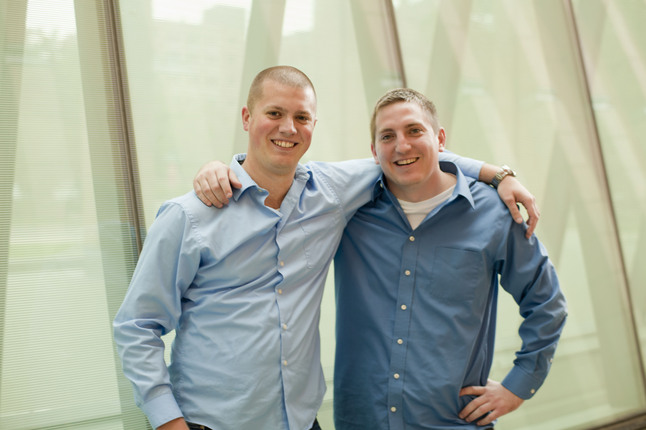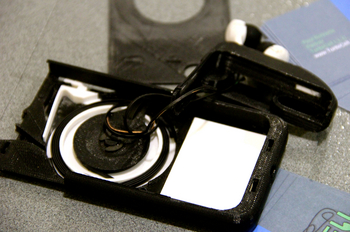Clik here to view.

TurtleCell co-founders Nick Turnbull (left) and Paul Schrems started the company when both were mechanical engineering students at the University of Michigan
Courtesy Nick Turnbull
When Paul Schrems got fed up with constantly untangling his headphones on his way to class, he knew he wasn’t alone in his frustration. As a mechanical engineering graduate student at the University of Michigan with a background in 3-D prototyping, he figured he was the right person to develop the solution.
Schrems teamed up with U-M mechanical engineering senior Nick Turnbull to launch TurtleCell, a company that aims to solve the headphone woes by keeping them wrapped up inside a specially designed and patented phone case.
“We built our first prototype Jan. 1, 2012,” Turnbull said. “I think officially we’re on version 32 by now.”
As the pair progressed through each version, the hard-shell cases got thinner and simpler. Turbull said the first iteration had more than 30 parts made on a 3-D printer, but the current version is down to 15 parts and is much easier to assemble.
Turnbull and Schrems took their invention to the American Society of Mechanical Engineers “iShow” innovation showcase in June. The pair beat out nine other semifinalists, including teams from Tufts, Harvard, Johns Hopkins and three teams from the Massachusetts Institute of Technology in the competition to win a $10,000 grand prize.
On the heels of the victory, TurtleCell launched a Kickstarter campaign to offer “version 32” of the case to consumers for preordering. Kickstarter is a crowdsourcing website that can help new companies and products get off of the ground. The company set a funding goal of $50,000 and will not receive any pledged funds unless the goal is reached.
Kickstarter projects can give out “rewards” to backers who pledge at certain levels and these incentives often include prototypes of the product offered at approximate cost. Many companies use the campaigns as a method of ensuring they have enough interest and in-hand capital to make a first production run.
“We’re hoping to get a little bit of profit out of the campaign, but it won’t be anything super significant,” Turnbull said.
“The main thing is to fund it, to get the units out, to get enough money so that we can comfortably get these units to the people who preorder them and then get the reaction from users so we can continue to improve.”
Other local companies that have used crowd funding to launch their products include Pinoccio, a tech startup that raised $105,000 in February, and The perfect Heist, a board game that raised nearly $60,000 after it caught the attention of viral website Reddit.
Clik here to view.

An early iteration of the TurtleCell shows its unique "pancake" design for the retractable headphone holder.
Ben Freed | AnnArbor.com
“That money is our lifeline right now. So we’re spreading it as thin as we can. We’re not using it to buy tooling or large chunks of machinery,” he said.
“We’re using it to do our testing and make new iterations and build our initial marketing campaign. Kickstarter is a great platform for us to use in getting our initial buzz out there. The best way to fund a consumer product project is to get people to buy it through preorders because then you don’t have to raise a ton of capital and sell part of your company.”
If the Kickstarter campaign is successful in raising the necessary $50,000, the company will work with a supplier in Minneapolis to manufacture the preordered TurtleCell cases. Turnbull said the company wants to move manufacturing to the Detroit area when it starts producing the cases in large quantities.
Local manufacturing is important to Schrems and Turnbull who both grew up in Michigan. The pair began their company while both were still U-M students and its first home was in the TechArb student startup incubator. Like Schrems, TurtleCell “graduated” recently to the Ann Arbor SPARK startup incubator — just one block down East Liberty Street.
Turnbull is still finishing his senior year at U-M but says he’s become a part-time student to focus on the company he and Schrems believe solves a problem that bothers a critical mass of people.
To prove how widespread the agitation is, a live Twitter feed on his company’s website showcases hundreds of people every day broadcasting to the world how upset they are with their tangled wires and earbuds.
The company had raised $16,800 as of Wednesday morning, with approximately two and a half more weeks until the Kickstarter campaign ends August 4. More than 50 TurtleCell cases have been preordered as part of the campaign and one backer pledged more than $1,000 for the perk of having a dinner party with the company’s founders.
Want to hear more? Watch the TurtleCell founders explain their product:
Ben Freed covers business for AnnArbor.com. You can sign up here to receive Business Review updates every week. Get in touch with Ben at 734-623-2528 or email him at benfreed@annarbor.com. Follow him on twitter @BFreedinA2